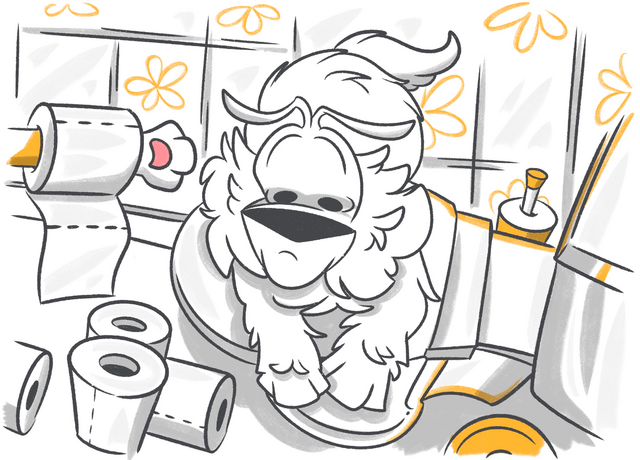If you own a dog, dog poop is a very real part of your life. But if you're reading this post, you've more than likely found yourself in the unenviable position of having to clean a poop that's, well, lacking in structural integrity and possibly even bordering on formless.
There's no way to put it delicately, but dog and puppy diarrhea is part of being a pawrent. Like in humans, there comes a point when having a runny tummy can go from harmless and temporary to much more severe.
We'll look at dog diarrhea in this post (not literally, thank goodness!) and cover all the essential things you need to know: what the color of dog diarrhea means, what to feed a dog with diarrhea, the best diarrhea medicine for dogs, and more.
We'll cover everything you need to know about navigating a very poopy situation.
Stop Googling - Ask a Real Vet
Content:
- What Does Dog Diarrhea Color Mean
- Best Food for a Dog with Diarrhea
- Diarrhea Medicine for Dogs
- Dog Vomiting and Diarrhea
- Dog Diarrhea with Mucus
- FAQs
- Conclusion
What Does Dog Diarrhea Color Mean
When your furry friend is experiencing digestive issues, the color of their diarrhea can provide crucial insights into their health.
“Diet, hydration, exercise and underlying health conditions” are all factors that can determine what a dog’s poop looks like, explains Dr Gabrielle Fadl, director of primary care at Bond Vet.
If your dog has diarrhea but is acting normally, the color of their poop might offer some clues as to the underlying problem. Understanding these signs is essential for pet owners, allowing for timely responses and care.
What does the color of dog diarrhea mean?
- Brown: Brown diarrhea in dogs is generally considered normal, indicating a diet rich in meat.
- Green: Green diarrhea in dogs could suggest that your dog is eating a lot of grass, possibly to soothe an upset stomach, or it might indicate gallbladder issues.
- Yellow: Yellow dog diarrhea is usually seen in dogs with a fast transit time through the digestive system or with a specific issue in the liver.
- Black or very dark: If your dog has black diarrhea, this can indicate bleeding in the upper gastrointestinal tract and warrants immediate veterinary attention.
- Red streaks: Blood in your dog’s diarrhea indicates the presence of fresh blood, often due to colitis, anal injuries, or a bacterial infection.
- Grey and greasy: This can point to a problem with the pancreas or biliary system.
For those using the Petcube Cam, monitoring your pet's health becomes more accessible, enabling you to notice changes in behavior or symptoms, including diarrhea, that might go unnoticed when you're away.
The Petcube Cam offers owners peace of mind by providing the ability to monitor these signs in real time, ensuring that any changes to your dog's digestive health are not overlooked. The device's ability to stream high-quality video directly to your smartphone means you’re always in the loop about your pet’s well-being, even when you’re not physically there.
Best Food for a Dog with Diarrhea
Diet plays a pivotal role in managing and alleviating symptoms of diarrhea in dogs. Here are some of the best foods for a dog with diarrhea:
- Boiled chicken and rice: A bland, easily digestible meal that can help soothe your dog’s stomach. Avoid using any oils, spices, or seasoning.
- Pumpkin: Pure pumpkin (not the pie filling) is rich in fiber, which can help firm up your dog’s stool. It’s also a good source of vitamins and minerals.
- Probiotic supplements: These can help restore the natural balance of the gut bacteria, improving digestive health.
- Boiled potatoes: Without any additives, boiled potatoes can offer a digestible source of carbohydrates.
- Plain yogurt: High in probiotics, plain yogurt can support gut health and is soothing for the stomach.
Dr Alex Avery from Our Pet’s Health extensively covers what you should and shouldn’t be feeding a dog with diarrhea in his YouTube video. “We certainly need to be avoiding rich foods, salty foods, fatty foods. So, that means no treats because they’re much more likely to upset your dog’s intestines further.”
Remember, when introducing any new food to your dog's diet, especially when they're experiencing diarrhea, it's crucial to start with small amounts to avoid further digestive tract irritation.
Diarrhea Medicine for Dogs
Medication may be necessary when dietary adjustments are not enough to resolve your dog's diarrhea. However, it's crucial to consult a veterinarian before administering any dog diarrhea medication, as they can provide a more accurate diagnosis and prescribe appropriate treatment based on the underlying cause of the diarrhea. Common diarrhea medicines for dogs include:
- Probiotics: These supplements help restore healthy gut bacteria, which can be upset during episodes of diarrhea.
- Anti-parasitic treatments: If parasites cause diarrhea, your vet may prescribe a medication to eliminate the infection.
- Anti-inflammatory medications: For dogs with inflammatory bowel disease or certain infections, anti-inflammatory drugs can reduce intestinal inflammation and discomfort.
- Antibiotics: If a bacterial infection is the cause, antibiotics may be necessary to treat diarrhea.
Always follow your veterinarian’s instructions regarding dosages and treatment duration to ensure your dog’s safety and health.
The secret weapon that every pet parent needs is an Online Vet by Petcube. For just $20 a month, you have access to a team of trained veterinarians who can answer any questions, ease your concerns, and even save you an unnecessary visit to the vet.
Simply message a professional via Online Vet, share your concerns or questions, attach a photo or a video, and get an instant reply 24/7. Not sure if your dog's diarrhea is severe? Ask the Online Vet!
You can add an Emergency Fund option for just $9 more a month, which will pay out up to $3000 a year for emergency veterinary care.
Lucky for you, we are offering an exclusive 27% off on subscriptions if you follow this link. You wouldn't want to miss this good deal for your pet's health.
Dog Vomiting and Diarrhea
Simultaneous vomiting and diarrhea can indicate a more severe condition that requires immediate veterinary attention. Causes can range from infections and parasites to dietary indiscretions and more serious health issues like pancreatitis or liver disease. Monitoring your dog's behavior and symptoms closely is crucial for early detection and treatment.
The greatest danger when your dog is throwing up and has diarrhea is dehydration. It’s best not to wait too long to seek advice as they can dehydrate quite quickly, even faster in puppies.
The Petcube Cam 360 can be essential in observing these symptoms, especially when you're not at home. Real-time alerts and video camera access allow pet owners to act swiftly, ensuring dogs receive the care they need without delay.
Dog Diarrhea with Mucus
The presence of mucus in dog diarrhea can signify inflammation in the colon. While a small amount of mucus can be normal, a noticeable and sudden increase often points to conditions such as colitis. Causes for this inflammation range from stress and infections to more severe conditions like inflammatory bowel disease.
FAQs
What does it mean if my dog has a cough and diarrhea?
Diarrhea accompanied by a cough can indicate various potential health issues ranging from allergies and dietary indiscretion to chronic conditions or foreign body obstructions. Monitor your dog closely. If the symptoms persist or your dog starts displaying other symptoms (Like lethargy, vomiting, loss of appetite, or difficulty breathing), contact your vet as soon as possible.
Why does my dog have diarrhea at night?
If your dog experiences diarrhea primarily at night, it’s likely related to stress and anxiety. However, it’s essential to observe any other symptoms and contact your vet if symptoms persist or other signs of illness become present.
How long should I wait before consulting a vet if my dog has diarrhea?
It’s advisable to consult a veterinarian if diarrhea persists for more than 24 hours or immediately if it’s accompanied by vomiting, lethargy, or blood.
Can I give my dog over-the-counter diarrhea medicine?
Never give your dog medication without consulting a vet, as some human medications can be toxic to dogs. These dosages are also much stronger than your dog's body requires.
Is diarrhea always a sign of illness in dogs?
Occasional diarrhea can result from dietary indiscretion. However, frequent or severe diarrhea can signify a more serious health issue.
How can I prevent diarrhea in my dog?
Maintain a consistent, high-quality diet, ensure your dog has access to clean water, and keep up with regular veterinary check-ups to prevent parasites and infections.
Conclusion
Diarrhea in dogs can be distressing for both pets and their owners. You can ensure your dog's swift recovery by understanding the potential causes and appropriate responses, including dietary adjustments, medication, and when to seek veterinary care. The Petcube Cam offers additional monitoring, helping pet owners stay informed and responsive to their dog's health needs. Remember, early detection and treatment are key to managing dog diarrhea effectively.

Was this article helpful?
Help us make our articles even better









